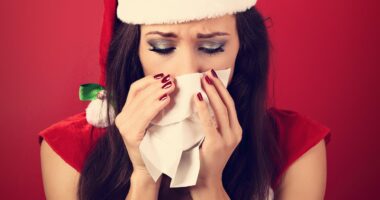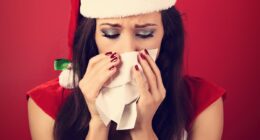The smell of a bonfire on a cold, crisp night, kicking your way through piles of fallen leaves and even the aroma of a festive pine tree are all things that make winter feel like a particularly magical time of year.
But if you have a lung condition, such as asthma, chronic obstructive pulmonary disease (COPD) or bronchiectasis, they could have far more dangerous undertones – and are largely to blame for your risk of ending up in A&E doubling in winter.
In autumn and winter, cold weather, cold and flu viruses, damp and mould, and even Christmas trees can all make symptoms like wheezing and coughing worse, which makes it harder for people with lung conditions to breathe. So what should you be looking out for and what measures can you take to protect yourself?
SMOKE
November 5, Diwali and New Year’s Eve bring with them bonfires and fireworks, which can be dangerous if you have a lung condition.
“Fireworks are made using a mix of chemicals and when they are set off, they release harmful pollutants into the atmosphere that can damage your lungs, including nitrogen dioxide, sulphur dioxide, and particulate matter,” explains Dr Andrew Whittamore, clinical lead at Asthma and Lung UK.
“Breathing in smoke and chemicals like this can irritate your airways, which means fireworks could worsen the symptoms of your lung condition. They could also cause a potentially life-threatening asthma attack, as can breathing in the smoke from bonfires.”
“Breathing in smoke and chemicals like this can irritate your airways, which means fireworks could worsen the symptoms of your lung condition. They could also cause a potentially life-threatening asthma attack, as can breathing in the smoke from bonfires.”
More than 50% of people surveyed as part of Asthma + Lung UK’s 2024 Life with a Lung Condition Survey said air pollution was a trigger for their asthma and 63% said it caused a flare-up of COPD symptoms, such as chest tightness and breathlessness.
“It’s best to avoid being too near bonfires and fireworks if you do have a lung condition, but if this is not possible, stand far back if you’re going to a big display,” says Dr Whittamore. “Also, check which direction the wind is blowing, so you can avoid breathing in too much smoke.
“Wear a scarf loosely wrapped around your nose and mouth or a face mask if this is comfortable for you and make sure you have your reliever inhaler with you if you use one, and that the people you are with know what to do if your symptoms suddenly get worse.”
COLD AIR
If you have a lung condition like asthma or COPD you may find that as winter kicks in and temperatures begin to drop, your symptoms get worse. “This is because cold air can cause the airways to narrow, which can increase the amount of mucus produced and make it harder for you to breathe,” explains Dr Whittamore.
“Cold, dry air can also cause irritation in the airways and worsen symptoms like breathlessness, coughing and wheezing. It also weakens the immune system, making it harder to fight respiratory infections like colds and flu.”
In a recent survey by Asthma + Lung UK, 69% of people with asthma and COPD surveyed said cold weather was a trigger for them. Dr Whittamore, has this advice to protect your lungs against the cold in winter: “When outside, breathing in through your nose helps to warm up the air, as does wearing a mask or loosely wrapping a scarf around your nose and mouth if it is comfortable to do so. Wearing thermals and layers of thinner clothing instead of one thick layer can keep you warmer too.
“Indoors, if you can, try heating your home to at least 18 degrees, use blankets and hot water bottles to stay warm, close your bedroom windows at night and use draft excluders or blockers to try and reduce the amount of cold air in a room.
“It is also a good idea to have regular hot drinks and check the weather before you go out. Stay inside if it’s too cold or windy for you. Whatever your winter triggers may be, the most important thing you can do is to use your preventer inhaler regular as prescribed and carry your reliever inhaler with you wherever you go, and make an urgent appointment to see your GP, specialist, or asthma nurse if your symptoms are getting worse.”
RESPIRATORY VIRUSES
Respiratory viruses like flu thrive in winter. “This is because people meet and gather indoors more often, meaning viruses can spread more easily,” says Dr Whittamore. “Catching a cold or flu can trigger asthma or cause a flare-up of a lung condition like COPD. Protect yourself by avoiding people you know are unwell, staying away from crowded indoor places, and washing your hands regularly.”
If you do get sick, keep an eye on your symptoms and if you do feel them getting worse, make an appointment to see your GP.
“The best way to boost your protection against viruses is to have your winter vaccines if you are eligible, which include the flu and RSV. Flu can be a serious illness, especially if you’re living with a lung condition, and getting the flu vaccine reduces the risk that you will need to be admitted to hospital.”
He adds: “Eighty per cent of people with asthma alone recognise that colds and flu can be a trigger for them. Flu can also lead to chest infections and pneumonia. Too many people each year end up ill and in hospital, and even die from complications of these viruses.
“These vaccinations save lives, reducing the spread of these bugs and helping your body fight the illness so that you are less ill and less likely to need emergency treatment this winter.”
MOULD
This usually appears as fuzzy black, white or green patches on your walls, ceiling or tiles. It might also smell damp and musty. “If you are allergic to mould it can cause symptoms like coughing, wheezing, sneezing and watery eyes, or cause symptoms of a lung condition like asthma or COPD to worsen,” says Dr Whittamore.
“In winter, mould can be more prevalent inside buildings because as the temperature of the air falls, the water vapour that it carries is released on to cold surfaces, forming droplets of condensation that create damp patches.
“Mould is dangerous to those with lung conditions as not only can it worsen symptoms in those who already have illnesses like asthma or COPD, increasing the likelihood of an asthma attack or COPD flare-up, but long-term exposure to mould can cause lung conditions like asthma in previously healthy individuals.
“Keeping your home well ventilated and warm – at least 18C in colder months – is one of the most effective ways to tackle indoor mould as this helps reduce condensation, which leads to mould,” he says.
CHRISTMAS
It might be the most wonderful time of year for many, but for those with lung conditions such as asthma, it can come with risks.
“Dust from decorations that have been put away for months, pollen from real Christmas trees, gifts such as perfume and candles, and even certain festive foods can be a trigger for someone’s lung condition,” warns Dr Whittamore.
“Real Christmas trees can bring mould spores and pollen into the house which can be allergens and trigger asthma or COPD symptoms. And in a warm home, these spores can multiply.
“Then there are the sulphites used in wine and as a preservative in foods such as gravy, cured meats and dried foods – all typical festive treats which can prompt an allergic reaction leading to an asthma attack.”
Even family and friends coming over to celebrate can be an issue, particularly if they have pets and bring pet dander with them on their clothing. This is another common asthma trigger, says Dr Whittamore.
“Gifts that contain strong odours like candles and perfumes can also be an issue. Asthma is a lung condition caused by inflammation of the airways and can be set off by a number of things, most commonly pollens, pollution and viruses,” he adds.
“But there are other triggers, including dog and cat hair, exercise, smoke and perfumes which people need to be aware of at Christmas time.”
For those who may be affected, he advises using artificial Christmas trees, storing decorations in an airtight box when putting them away and wiping them down with a wet cloth outdoors before reusing them again.
He also drives home you should avoid any food and drink containing sulphites, request non-perfumed presents and ask friends and family with pets to make sure they don’t touch or pick up the animals before they visit you.
Also, in Asthma + Lung UK’s Life with a Lung Condition Survey, two in five people said that pets triggered their asthma symptoms. “Again, if you have a preventer medicine or MART inhaler, then taking it every day, as prescribed will mean that you are less likely to react to any of your asthma triggers, including animals and pets,” says Dr Whittamore.
“Your preventer inhaler keeps inflammation down in your airways and makes it less likely you’ll get symptoms when you come across your triggers.
“Ask your doctor, nurse or pharmacist about allergy medicines like antihistamine tablets or nasal sprays which can help too.”
■ Receive tailored advice about how to look after your lungs this winter at asthmaandlung.org.uk/notjustaseason









